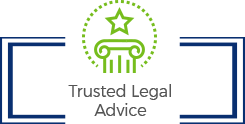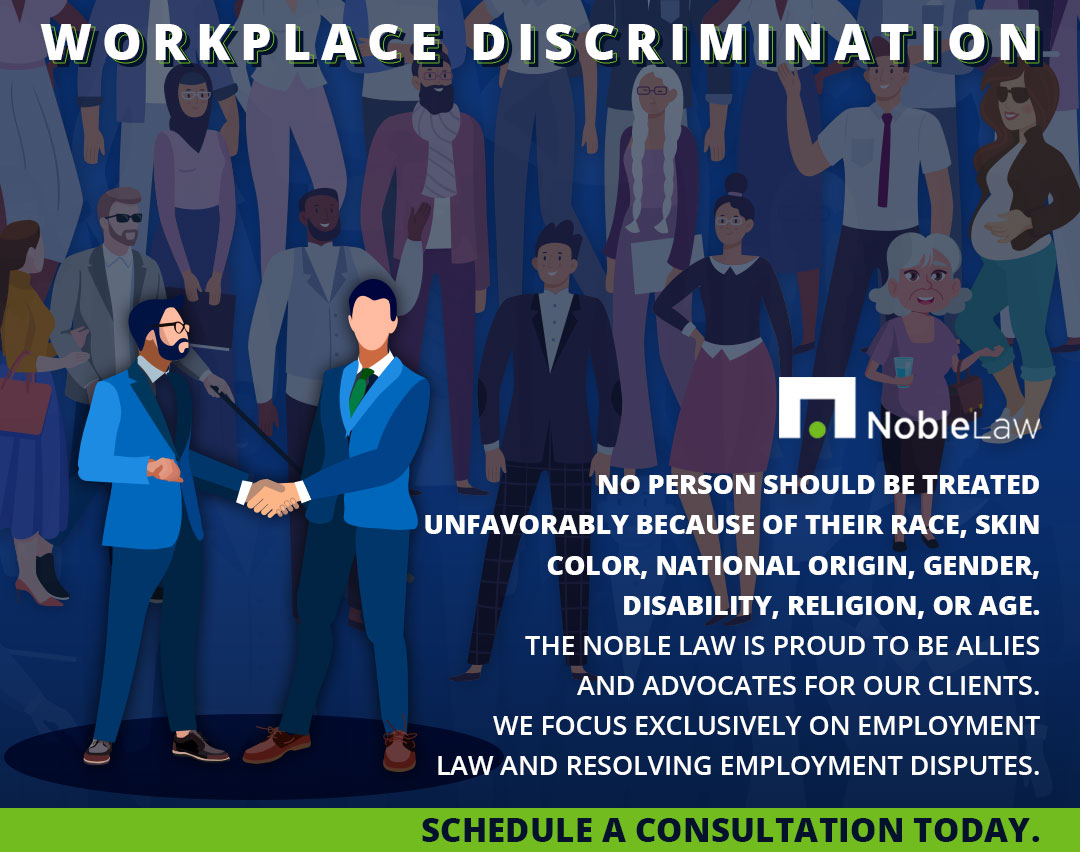The average adult in the U.S. will spend an estimated 90,000 hours working during their lifetime. But what if work isn’t a safe space? Workplace discrimination is real and in some cases it’s illegal. Not only does job harassment and discrimination violate the law in some instances, but it also affects victims’ mental, emotional, and physical well-being.
Charleston workplace discrimination lawyers at The Noble Law believe that no one should be treated unfairly because of their race, color, national origin, sex, disability, religion, or age. If you are experiencing harassment at work, or your job environment has become downright toxic, help is available. Call or connect online to schedule a consultation with our team today.




What Is Workplace Discrimination?
Workplace discrimination, or employment discrimination, occurs when an applicant or employee is treated less than favorably than other employees because of who they are.
Under state and federal anti-discrimination laws, these protected categories or classes include:
- Age (over 40)
- Color
- Disability
- Gender identity
- Genetic information
- National origin
- Race
- Religion
- Sex
- Sexual orientation
- Status as a protected veteran
Employment law is highly complex and nuanced. Workplace discrimination does not have to be intentional to be unlawful. And a single event does not necessarily constitute illegal discrimination, even if it is based on a protected activity.
Our employment law attorneys carefully review the facts of your situation to determine: (1) if discrimination occurred, and (2) what legal remedies are available to achieve justice.


Examples of Workplace Discrimination
Job discrimination takes many different forms and can involve any aspect of employment, from hiring and firing to promotions and compensation.
The U.S. Equal Employment Opportunity Commission (EEOC) breaks job discrimination down into the following categories:
Unfair Treatment
This is prejudicial treatment of people and groups based on the protected characteristics listed above. These behaviors include offensive comments, exclusion from meetings and promotions, being underpaid compared to colleagues, and wrongful termination.
Harassment
Harassment is unwelcome conduct based on any of the protected categories previously mentioned. Slurs, epithets, offensive jokes, ridicule, name calling, intimidation, and physical assaults or threats are all examples of harassment.
Harassment often creates a hostile work environment that makes it difficult for the victim to do their job. Under the law, in order to constitute a hostile work environment (i.e. actionable harassment), one of the following must be present:
- (1) enduring the harassment must become a condition of employment; or
- (2) the harassment / conduct must be so severe or pervasive that it creates a work environment that a reasonable person would find intimidating, hostile, or abusive.
Denial of a Reasonable Workplace Change
The Americans with Disabilities Act (ADA) requires employers to make reasonable accommodations for qualified workers with disabilities, provided they do not cause undue hardship to the employer.
Qualifying disabilities are mental or physical impairments that substantially limits one or more of the employee’s major life activities (ex. Breathing, walking, talking, hearing, seeing, sleeping, etc.). In order to be a qualified disabled person under the ADA, the employee must have a qualified disability and must be able to perform the essential functions of the job, with or without reasonable accommodation. Reasonable accommodations may include the following (depending on the employment situation): equipment modifications, shifting job duties, and making adjustments to the workspace.
Improper Questions or Disclosure of Personal Information
In some circumstances, employers are privy to workers’ personal health history and medical information. Disclosing these details unnecessarily is a form of discrimination, as is asking an employee questions about their genetic or medical information that has no relevance to their employment.
Retaliation
Workers who file complaints or participate in workplace discrimination investigations or lawsuits are protected from retaliation under the law.
Examples of retaliation include demoting or terminating a worker for filing a complaint with human resources, spreading rumors about their job performance or personal life, or giving the worker a poor job review simply because they are cooperating with an ongoing discrimination lawsuit.
Legal Protections and Rights
Several state and federal laws protect workers in South Carolina from workplace discrimination. The South Carolina Human Affairs Law is far-reaching. It protects applicants and employees from discrimination based on: age (40+), race, color, religion, sex, national origin, or disability. Sex includes pregnancy, childbirth, lactation, and related medical conditions.
Title VII of the Civil Rights Act of 1964 provides very similar protections on the federal level.
The Equal Pay Act of 1963 in part prohibits sex-based discrimination by ensuring all genders who perform substantially equal work receive the same wages and benefits.
The South Carolina Human Affairs Commission is the state agency that oversees and enforces the South Carolina Human Affairs Law. The EEOC is the government body that oversees and enforces key federal anti-discrimination laws.


Steps to Take If You Suspect Workplace Discrimination
Every worker in this country has the right to work in an environment that is free from discrimination. If you encounter harassment, the first step is to tell the perpetrator to stop, report the harassment internally through the policies and procedures set forth by your employer for reporting harassment, and contact an employment law attorney at The Noble Law for guidance. In some circumstances, this may be enough to end the offensive behavior.
Of course, if you feel unsafe confronting the individual in question, withdraw from the interaction and go directly to your employer to file a complaint, ideally in writing. Ask for a copy of the report, and be sure to document your experience. Save and make copies of emails, texts, photos, and any other evidence to support your claim.
Documenting these incidents is critical to validate your claims and build a compelling case if you decide to take legal action. If your employer fails to rectify the situation, you can go a step further and file a complaint with the EEOC.
Some EEOC complaints are resolved through mediation. In other instances (or if mediation is not successful), the EEOC will investigate your claim and make a decision. If they do not find that a violation occurred, you have 90 days to file a workplace discrimination lawsuit. Even if they do find a violation, the company may still be reticent to resolve the matter and you may still receive a determination and letter that gives you 90 days to file the lawsuit in Federal court. Your attorney assists and advises you at each step of this process.
How a Charleston Lawyer Can Help
Diversity, equity, and inclusion on the job and in life are core values at The Noble Law. Our award-winning Charleston workplace discrimination lawyer is proud of our firm’s history of protecting workers across the Carolinas.
Our practice areas include:
- Workplace harassment and discrimination
- Pay, overtime, and leave disputes
- Workplace sexual harassment cases
- Retaliation and whistleblower claims
- Executive compensation and contract review
- Non-compete review and negotiation
The Noble Law also provides third-party workplace investigations for firms facing harassment complaints. This gives our lawyers unique insight into how employers handle claims, which helps us better serve victims of workplace discrimination.
Why Choose Our Charleston Workplace Discrimination Lawyer
From your first encounter with workplace discrimination until the time your matter is resolved—and beyond—we remain ready and available to answer your questions, manage your claim, and protect your interests.
Don’t depend on inexperienced attorneys to go up against your employer. Trust your case to workplace discrimination lawyers committed to protecting your interests and achieving good results.
Call or inquire online to schedule a consultation today. With office locations in Mount Pleasant, Raleigh-Durham, and Charlotte, The Noble Law proudly serves clients across North and South Carolina.

Learn More
The Noble Law is committed to educating our communities in South Carolina about employment law. We believe that one of the first steps to a more equitable workplace is for employees to understand their rights. And we also believe that part of our job as employment lawyers is to share what we know with others. Explore our resources, including more employment law videos, and keep up with our employment law firm news by following Noble Notes.
Along with representing clients in the area of workplace discrimination, we also provide legal counsel to clients with claims of workplace harassment, executive compensation disputes, retaliation and whistleblower, and pay, overtime, and leave cases. Learn more about our law firm on our Practice Area page and if you’re interested in speaking with one of our employment lawyers, contact us today.


